素食主义英文版共30页
素食的合理营养英文版
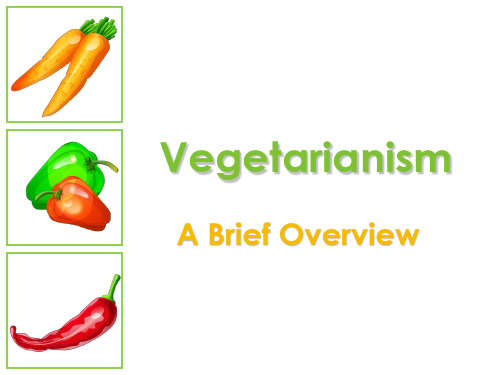
• Pesco: vegetarians who eat fish
• Vegans: vegetarians who rely exclusively on plant foods
– Lower weight correlates with high intakes of fiber and low intakes of fat
• Hypertension
– Vegetarians have lower blood pressure and lower rates of hypertension
Vegetarian Diet Planning
• The more restricted the vegetarian diet is the greater the challenge is to achieve a nutritionally adequate diet.
• The goal for the vegetarian in diet planning is the same as the omnivore: consume a variety of foods to obtain all of the needed nutrients.
vegetarian diets
Vegetarian
• A general term used to describe people who exclude meat, poultry, fish, or other animal-derived foods from their diets.
“素食”英文演讲稿

“素食”英文演讲稿第一篇:“素食”英文演讲稿In some degree, I agree with going veggie.I once had a neighbor who is a Buddhist.He believes that vegetarian means no killing, and in this way, we can develop our compassion.What’s more, someone says that the flesh and blood of animals is dirty, and eating them would destroy biologic chain.It’s said that the gastric acid of predators are 20 times as human.So our stomach is not strong enough to digest flesh and b one.What’s more, the loss of surface soil is the cause of the disappearance of many civilizations.And now 85 percent of the loss of surface soil in American is caused by stockbreeding.There are many old people around me who go veggie.They mostly do that fo r health.It’s said that plant foods lower the risk of chronic disease, such as, Hypertension, Gastropathy, and so on.In addition, it can also reduce the incidence of cancer, especially colorectal cancer.Besides, it can also anti-aging and make you more beautiful.And my mother told me that we can get smarter if we insist eating plant food.And plant food can make us mild and energetic.For me, I eat plant food just to lose weight at first.But gradually, with the increase of age, I eat plant food for health.Though I am only 20 years old, I have had enteritis for almost 6 years.So, to have better body, I have to eat plant food. 第二篇:素食健康,从我做起演讲稿素食健康,从我做起演讲稿尊敬的老师们,亲爱的同学们,大家好,我是来自32届2班的朱禹潼,非常荣幸今天能有机会在国旗下进行讲话,我所演讲的题目是——素食健康,从我做起。
英语素食主义演讲稿
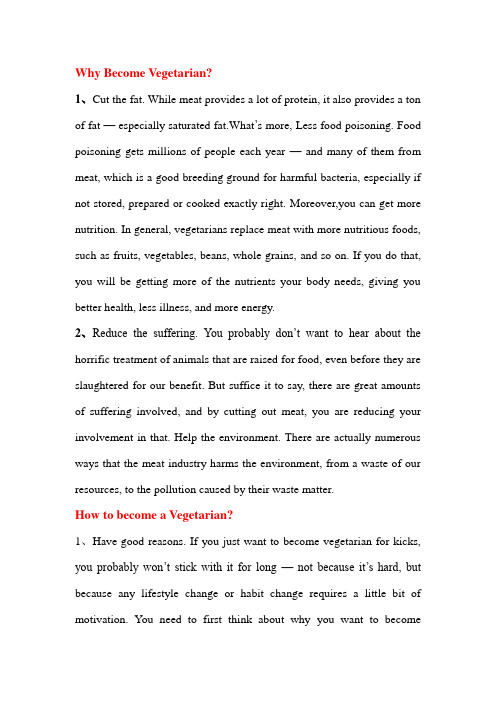
Why Become Vegetarian?1、Cut the fat. While meat provides a lot of protein, it also provides a ton of fat — especially saturated fat.What’s more, Less food poisoning. Food poisoning gets millions of people each year — and many of them from meat, which is a good breeding ground for harmful bacteria, especially if not stored, prepared or cooked exactly right. Moreover,you can get more nutrition. In general, vegetarians replace meat with more nutritious foods, such as fruits, vegetables, beans, whole grains, and so on. If you do that, you will be getting more of the nutrients your body needs, giving you better health, less illness, and more energy.2、Reduce the suffering. You probably don’t want to hear about the horrific treatment of animals that are raised for food, even before they are slaughtered for our benefit. But suffice it to say, there are great amounts of suffering involved, and by cutting out meat, you are reducing your involvement in that. Help the environment. There are actually numerous ways that the meat industry harms the environment, from a waste of our resources, to the pollution caused by their waste matter.How to become a Vegetarian?1、Have good reasons. If you just want to become vegetarian for kicks, you probably won’t stick with it for long —not because it’s hard, but because any lifestyle change or habit change requires a little bit of motivation. You need to first think about why you want to becomevegetarian, and really believe in it. The rest is easy.2、Some people prefer to give up meat all at once. While this takes a little more determination than the gradual solution I advocate, it’s not that hard, It should only take a few days to get used to it, and then you’ll have very little trouble after that.。
素食主义英语作文
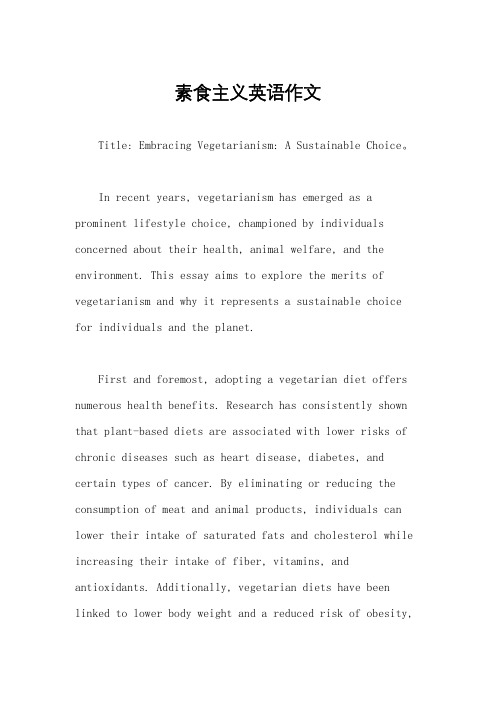
素食主义英语作文Title: Embracing Vegetarianism: A Sustainable Choice。
In recent years, vegetarianism has emerged as a prominent lifestyle choice, championed by individuals concerned about their health, animal welfare, and the environment. This essay aims to explore the merits of vegetarianism and why it represents a sustainable choice for individuals and the planet.First and foremost, adopting a vegetarian diet offers numerous health benefits. Research has consistently shown that plant-based diets are associated with lower risks of chronic diseases such as heart disease, diabetes, and certain types of cancer. By eliminating or reducing the consumption of meat and animal products, individuals can lower their intake of saturated fats and cholesterol while increasing their intake of fiber, vitamins, and antioxidants. Additionally, vegetarian diets have been linked to lower body weight and a reduced risk of obesity,further contributing to overall health and well-being.Moreover, vegetarianism aligns with ethical considerations regarding animal welfare. The industrialized production of meat often involves factory farming practices that subject animals to cramped and unsanitary conditions, as well as routine use of antibiotics and hormones. By choosing not to support this system, vegetarians actively promote compassion and respect for all living beings. Opting for plant-based alternatives allows individuals to enjoy nutritious and flavorful meals without contributing to the suffering of animals.Beyond personal health and ethical concerns, vegetarianism plays a crucial role in addressing environmental challenges. The meat industry is asignificant contributor to greenhouse gas emissions, deforestation, and water pollution. Livestock farming requires vast amounts of land, water, and feed resources, leading to habitat destruction and biodiversity loss. By transitioning to a plant-based diet, individuals can significantly reduce their carbon footprint and minimizeenvironmental degradation. Studies have shown that plant-based diets require fewer natural resources and produce lower emissions compared to diets rich in animal products.Furthermore, the adoption of vegetarianism promotes food security and sustainability on a global scale. As the world's population continues to grow, the demand for food is projected to increase significantly. However, the current food system is inefficient and unsustainable, with a disproportionate amount of resources dedicated to animal agriculture. By shifting towards plant-based diets, we can free up land and resources to produce more food for human consumption, alleviating hunger and malnutrition in vulnerable communities.In conclusion, vegetarianism offers a myriad of benefits, ranging from improved health outcomes to ethical considerations and environmental sustainability. By choosing to adopt a plant-based diet, individuals can make a positive impact on their own well-being, the welfare of animals, and the health of the planet. As awareness grows and more people embrace vegetarianism, we move closer tocreating a more compassionate, equitable, and sustainable world for future generations.。
素食英文版
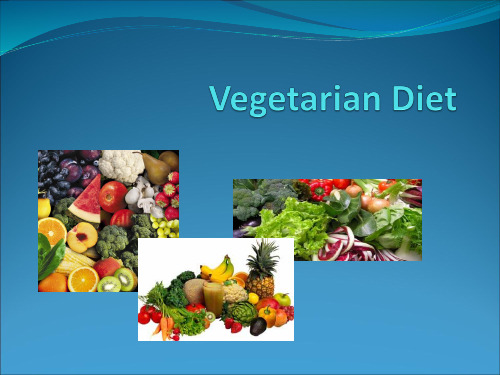
Choose 1% or skim milk products, low fat or no fat yogurt, and low fat cheeses
Key Nutrients
Protein
n-3 fatty acids (omega 3 fatty acids) Iron
Zinc
Vegan-excludes meat, dairy, eggs, honey
Lacto – excludes meat, eggs (but includes dairy
products and honey)
Ovo – excludes meat, dairy products (but includes
Iodine Calcium Vitamins D Vitamin B-12
Meeting Protein Needs
Beans
Legumes Nuts
Seeds
Dairy products Milk Yogurt Cheese
Summary
Diet that does not include meat
Added salt, sugar and fat
Frying vegetables in oil Adding sugar, butter to fruits during cooking Canned beans with added salt High calorie additions to whole grains
lower blood pressure lower rates of hypertension
type 2 diabetes
素食主义英文作文
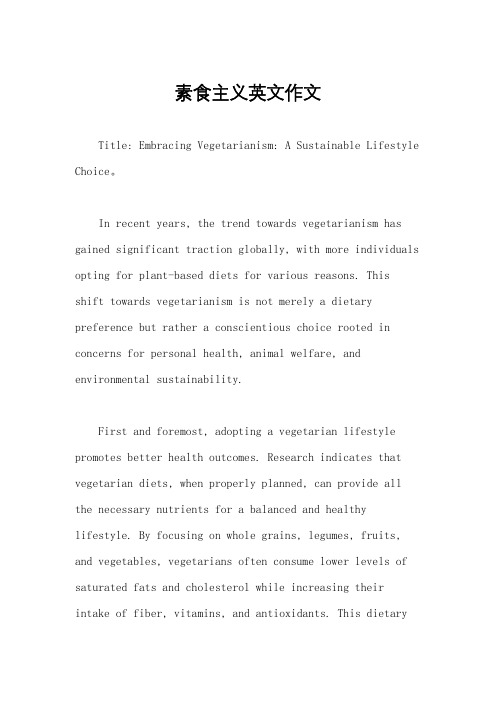
素食主义英文作文Title: Embracing Vegetarianism: A Sustainable Lifestyle Choice。
In recent years, the trend towards vegetarianism has gained significant traction globally, with more individuals opting for plant-based diets for various reasons. Thisshift towards vegetarianism is not merely a dietary preference but rather a conscientious choice rooted in concerns for personal health, animal welfare, and environmental sustainability.First and foremost, adopting a vegetarian lifestyle promotes better health outcomes. Research indicates that vegetarian diets, when properly planned, can provide all the necessary nutrients for a balanced and healthy lifestyle. By focusing on whole grains, legumes, fruits, and vegetables, vegetarians often consume lower levels of saturated fats and cholesterol while increasing their intake of fiber, vitamins, and antioxidants. This dietarypattern has been linked to reduced risks of chronicdiseases such as heart disease, diabetes, and certain types of cancer.Moreover, vegetarianism aligns with ethical considerations regarding animal welfare. Many people choose to forgo meat consumption due to concerns about the treatment of animals in the food industry. Theindustrialized methods of animal farming often involve confinement, overcrowding, and inhumane slaughter practices, which raise ethical dilemmas for conscientious consumers.By abstaining from meat consumption, vegetarians actively participate in reducing the demand for products derivedfrom animal exploitation, thereby promoting a more compassionate and humane treatment of animals.Beyond individual health and ethical concerns, vegetarianism plays a crucial role in addressing environmental sustainability challenges. The meat industryis a significant contributor to environmental degradation, including deforestation, water pollution, greenhouse gas emissions, and habitat destruction. Livestock farmingrequires vast amounts of land, water, and feed resources, leading to environmental strains and contributing to climate change. By transitioning to plant-based diets, individuals can significantly reduce their ecological footprint, conserve natural resources, and mitigate the adverse impacts of animal agriculture on the planet.Furthermore, the practice of vegetarianism fosters a deeper connection with nature and encourages mindfulness about food choices. By prioritizing plant-based foods, individuals become more attuned to the seasons, biodiversity, and the interconnectedness of ecosystems. This heightened awareness promotes sustainable agricultural practices, such as organic farming and crop rotation, which support soil health and biodiversity conservation. Additionally, vegetarianism encourages culinary creativity and exploration of diverse cuisines, offering a rich tapestry of flavors, textures, and cultural traditions that celebrate the abundance of plant-based foods.In conclusion, embracing vegetarianism represents a holistic lifestyle choice that encompasses considerationsfor personal health, animal welfare, and environmental sustainability. By adopting plant-based diets, individuals can enjoy numerous health benefits, uphold ethical principles regarding animal rights, and contribute to the preservation of our planet's precious resources. As awareness grows about the interconnected challenges of health, ethics, and the environment, vegetarianism emerges as a compelling pathway towards a more sustainable and compassionate future for all.。
Vegetarianism(素食主义)

V egetarianismLiterally, we can perceive vegetarianism as a kind of diet that only consists of vegetables. Actually, the authority defines vegetarianism as a catering culture, and the people who practice it are called vegetarians. Their diet consists mainly or entirely of food that comes from plant sources, such as vegetable and fruit.( Some vegetarians don’t refuse eggs and milk, though. )When referring to vegetarianism, we may conjure up something related to religion in our mind. Indeed, it originated in the religion of ancient India, which has the largest number of vegetarians now all over the world. In China, vegetarianism prevailed when the emperor of the Liang Dynasty, who was also a devout Buddhist, enacted a law forbidding monks to eat meat. But vegetarianism is not merely a law to the monks. It also has something to do with ethical customs or the belief of some devout disciples or even personal preference of eating. And today’s vegetarians have other reasons of going for vegetarianism, among which health maybe a major consideration.Gone were the days when many people suffered from starvation. Nowadays, meat is accessible to most families. But with the rising of living standard, people begin to realize that eating too much meat is not good for health. So they want their diet to be more balanced and more proper, which means less meat and more vegetable. Some even advocate that vegetarianism is best for health, which has attained general currency in a period of time when many people are paying more and more attention to their health. Thus, some have determined to be a vegetarian for the sake of health. Surely, a vegetarian diet can lower your heart pressure and cholesterol level, and decrease the possibility of suffering from cancers. But vegetarianism is not all good. Due to a lack of some necessary nutrients—some types of proteins, for example, vegetarian diets can also make people fall ill, according to scientific researches.Can you imagine that vegetarianism even has positive contribution to environmental protection? It is said that since eating meat means feeding livestocks, and livestocks will emit methane, which is a kind of greenhouse gas. So, eating less meat and more vegetable means less greenhouse gas emission and a betterenvironment.Through thousands of years of development, vegetarianism has become a profound concept which has much deeper meaning than just an eating habit. Those serious vegetarians take it as a belief, considering it as a way to restrain their desires and a way to show their sympathy for life. For non-vegetarians, we can learn from its positive aspect, such as the respect for life and we can eat less meat and more vegetables to keep fit and even to make contribution to environmental protection.。
关于素食的英文素材

关于素食的英文素材英文回答:Veganism: A Comprehensive Guide.Veganism is a philosophy and way of living that seeks to exclude all forms of animal exploitation and cruelty. Vegans abstain from consuming any animal products,including meat, dairy, eggs, honey, and any other products derived from animals.Benefits of Veganism.Adopting a vegan lifestyle offers numerous benefits for individuals, animals, and the environment:Health: Vegan diets are rich in fruits, vegetables, whole grains, and legumes, providing an abundance of vitamins, minerals, antioxidants, and fiber. Studies have linked veganism to a reduced risk of chronic diseases suchas heart disease, stroke, type 2 diabetes, and some types of cancer.Animal Welfare: By abstaining from animal products, vegans actively oppose the cruel practices of factory farming and animal agriculture. Animals in these facilities often endure inhumane living conditions, pain, and early death.Environmental Sustainability: Animal agriculture is a major contributor to environmental degradation. It requires vast amounts of land, water, and energy, and produces significant greenhouse gas emissions. Veganism promotes sustainable land use and reduces our environmental impact.Challenges of Veganism.While veganism offers many benefits, it also presents some challenges:Nutrient Deficiencies: Vegans need to pay careful attention to their nutrient intake to ensure they aregetting enough vitamins B12, vitamin D, calcium, and other essential nutrients that are primarily found in animal products. Supplements or fortified foods can help meet these needs.Social Isolation: In some social settings, vegans may face pressure to consume animal products or be excluded from social events that revolve around food. It's important to have supportive friends and family or connect with vegan communities for a sense of belonging.Convenience: Finding vegan options when eating out or traveling can be challenging. However, the availability of vegan food is expanding rapidly, making it easier to adhere to a vegan lifestyle.Getting Started with Veganism.Embracing a vegan lifestyle can be a gradual process:Start with Meatless Mondays: Begin by eliminating meat from your meals one day a week. Gradually increase thefrequency of meatless meals until you feel comfortable going fully vegan.Experiment with Plant-Based Foods: Explore the wide variety of plant-based substitutes available for meat, dairy, and eggs. You may be surprised at how delicious and satisfying they can be.Read Ingredient Labels: Carefully check food labels to identify potential hidden animal ingredients. Look for terms such as "whey," "casein," "gelatin," and "lard."Seek Support: Join online vegan communities, attend support groups, or consult with a registered dietitian who specializes in plant-based diets.Conclusion.Veganism is a compassionate and sustainable way of living that offers numerous benefits for health, animals, and the environment. By adopting a vegan lifestyle, individuals can make a positive impact on the world whileembracing a healthier and more ethical way of life.中文回答:纯素主义,一个全面的指南。
